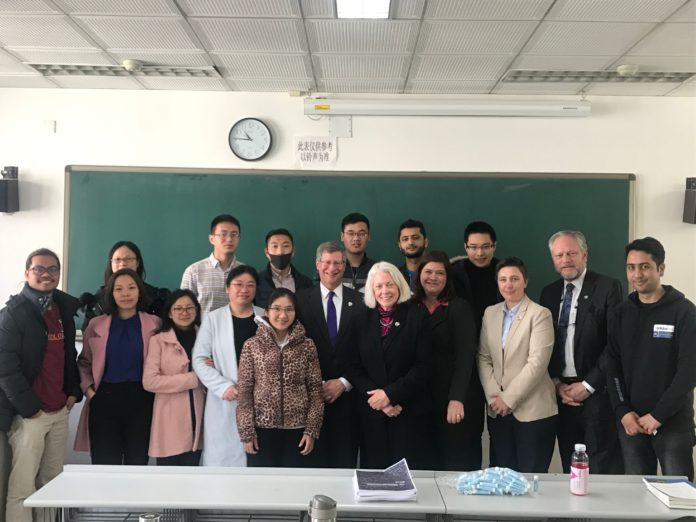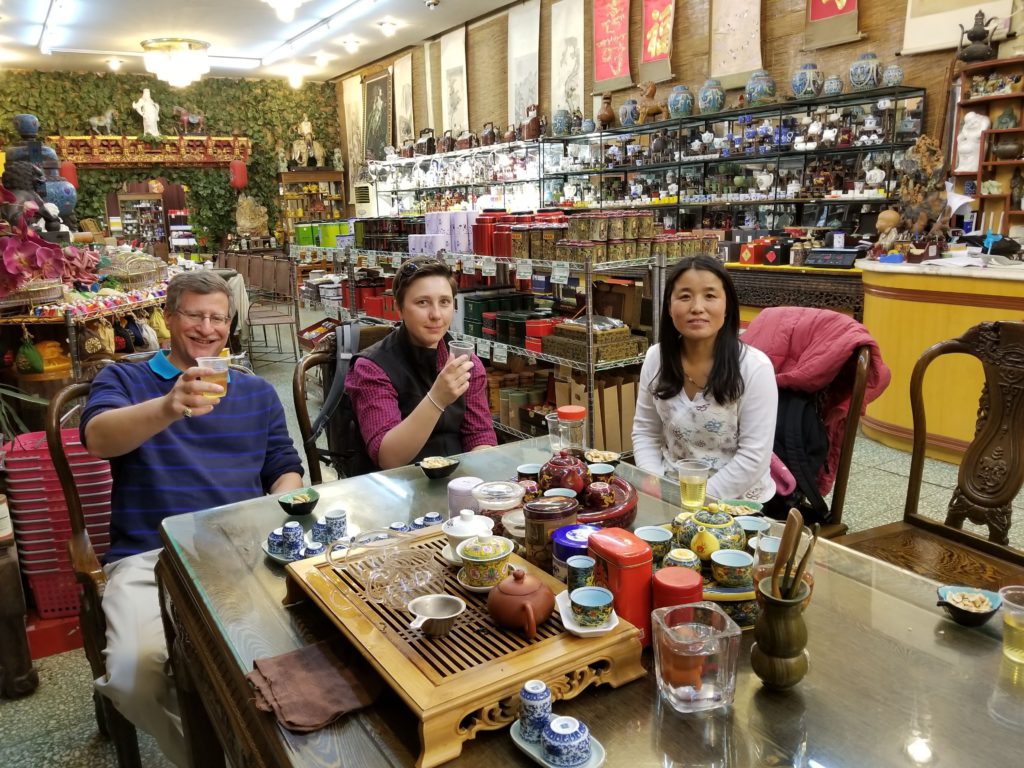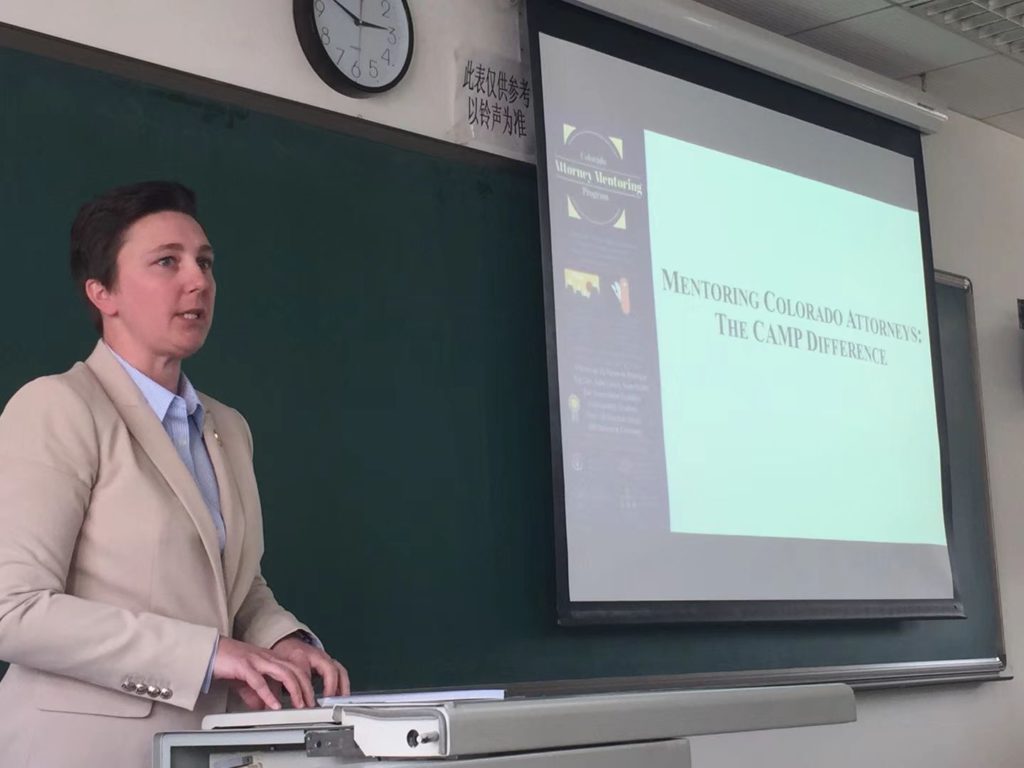

While trade war tensions simmer between the U.S. and China, local legal community leaders and a Beijing law school are enjoying a fruitful exchange of ideas.
Last month, a delegation from Colorado’s legal community visited the Beijing Institute of Technology to meet with professors and deliver talks on the American legal structure and profession.
BIT’s law school invited the group as a way of gathering insights on the American legal system and resources lawyers have for professional development. In addition to meeting with administrators and professors at BIT’s law school, each member of the group gave a lecture to law students on topics ranging from how judges are selected in the U.S. to practices that promote wellness among attorneys.
The group was in Beijing from March 20–24. Making the trip were Colorado Supreme Court Justice Richard Gabriel; Barbara Ezyk, executive director of the Colorado Lawyer Assistance Program; Margaret Funk, chief deputy regulation counsel at the Colorado Supreme Court Office of Attorney Regulation Counsel; Scott Meiklejohn, vice chair of Colorado Lawyers Helping Lawyers; and J. Ryann Peyton, director of the state Supreme Court’s Colorado Attorney Mentoring Program.
A Summit at Short Notice
The invitation to China originated from a chance conversation between Ezyk and a visiting professor from BIT last fall. Ezyk directs COLAP, an independent program that assists lawyers, judges and law students with emotional health, substance abuse and other issues that could affect their ability to function in the legal profession. The program itself, among other things, provides referrals to therapists for mental health or addiction issues and coaching.
COLAP, CAMP and OARC visit Colorado’s law schools twice a year to talk to students about the bar application process in preparation for the bar exam. The organizations were presenting at the University of Denver Sturm College of Law on Sept. 19 when a visiting professor, Hanling Wang, approached Ezyk as she was setting up COLAP marketing materials such as brochures, handouts and pens. She recalls the professor’s effusiveness about the program and remark that there isn’t a similar resource for lawyers and students where he’s from.
After the presentation, they talked more over lunch about health and wellness in the legal profession and how they play into ethics, and Wang told Ezyk that she ought to come visit the BIT law school some day to discuss these topics.
The two exchanged emails over the next two months, and Wang invited three more colleagues from BIT to come to Denver and visit with Ezyk and others whose programs aim to help judges, lawyers and law students. A meeting was scheduled for Sunday, Nov. 12 at the COLAP office. Ezyk invited Funk, Gabriel, Peyton, Meiklejohn and David Stark, Chair of the Supreme Court Advisory Committee on Attorney Regulation.
The meeting at COLAP’s office lasted about five hours, with each member of the Colorado contingent describing the state and federal legal system and the work they do in attorney wellness and ethics. The discussion was lively as it was long.
“They asked a lot of questions at that [Sunday] meeting,” Gabriel recalled of the visiting professors.
At the end of the meeting, the Colorado group members were formally invited to come to BIT to talk about their programs and provide more information about Colorado’s judicial system.
The group, minus Stark (who was unable to attend due to other commitments, Ezyk said), left Denver March 19 and returned March 24.

A Reform-Minded Audience
The Chinese legal system is in a period of gradual reform, from its jury system to the public’s access to court documents. Case law had been largely nonexistent in Chinese courts until 2010, when the Supreme People’s Court, the nation’s highest bench, began issuing “guiding cases” to inform the decisions of all lower courts in similar cases.
In 2014, China mandated that all court decisions be available to the public online. The nation’s courts have already produced a massive library of publicly available decisions. In 2015, 50 courts in China piloted a system that adds randomization to how the courts select “people’s jurors” to attend hearings and decide cases.
One issue that was front-and-center for the law students at BIT — as it is for law students anywhere else — was the bar exam. But the Chinese national bar has a passage rate of around 10 percent. As in many other countries, aspiring lawyers or judges in China can take the bar as undergraduates. Traditionally, even non-law majors were eligible to take the Chinese bar, but new rules have made the exam exclusive to only law students starting this year.
Gabriel said the professors and students at BIT were surprisingly “very forthcoming about what they perceived to be issues in the Chinese court system.” But in lecturing to the students, the Colorado contingent took pains not to be prescriptive, or to say that the American legal structure was necessarily better. “Nothing we talked about was critical of their systems,” Gabriel said.
Still, the students seemed to view many of the concepts discussed, like ethics oversight and mentoring programs, as things worth emulating. The law students were mostly in their early twenties, as law is an undergraduate degree in China, and they tended to be reform-minded, Peyton said.
“This next generation of [Chinese] lawyers wants more of what we have in this country,” Peyton said. For example, China doesn’t have a licensing body to regulate lawyers’ practices once they have passed the bar. That was something the students were especially interested in, she added. “They’re looking at reforming their legal system and aligning it more with the way we do things here,” Peyton said.
Gabriel lectured on the makeup of state and federal courts and how judges are selected throughout the U.S. He laid out the commonly argued pros and cons of the judicial elections as well as merit-based selection regimes like Colorado’s.
“They were struck by the way we pick judges,” he said.
The students also seemed intrigued by the concept that judges in the U.S. start out as lawyers; in Asia and Europe, it’s common for lawyers and judges to follow separate career tracks after passing the bar. Asked what he thought of America’s system, Gabriel told the students that he felt it important for a judge to have been a lawyer and have experience litigating in the courtroom. He couldn’t imagine being a judge and not having a practitioner’s perspective on what impact his decision might have, he said.
Peyton presented on CAMP and how the Colorado Supreme Court connects attorneys with mentors. Mentoring or lawyer assistance programs are unheard of in China, so the attendees didn’t have a frame of reference for what those programs do, she said. “But they were very curious about the fact that we provide opportunities for people to have that coaching.”
Meiklejohn shared his past experience with alcoholism and the ethics infractions that led to his suspension from the Colorado bar, and the recovery that led to his readmission. To get help, he’d turned to resources not unlike the organization he helps lead — Colorado Lawyers Helping Lawyers, a peer support program for legal professionals dealing with alcohol, drug abuse and mental health issues.
Substance abuse among lawyers may be a taboo subject in the states, but in China, “it wasn’t so much that it’s not talked about, it’s more that it’s just accepted,” Meiklejohn said. He added that problem-drinking wasn’t unique to lawyers and judges in China but reached across many professions. The attitude in China that he gleaned from incidental conversations there was “we’re just going to lose some.”
Meiklejohn said the concept of lawyers seeking help through 12-step programs and peer support networks for addiction seemed unusual enough to his audience “that they really didn’t know how to respond” to his talk. But he hopes he got them thinking that addiction among legal professionals is a problem they “can do something about,” he said.


In their five-day Beijing visit, the group got to do some sightseeing from the Great Wall to the Forbidden City to Tiananmen Square. It also afforded them more opportunities to visit with their hosts.
As trade war rhetoric heated up between the U.S. and Chinese governments, the quintet were asked plenty of questions about their political opinions, from President Donald Trump to tariffs. Gabriel said that being a judge, he had to be careful give apolitical answers.
Their hosts seemed fascinated by the idea that the American president could be personally sued, Peyton said.
Though this was his first time in China, Gabriel had previously done some world traveling and would make a point of talking to local lawyers and judges about legal practice in their countries. What he took away from the China trip echoes what he’d taken away in those previous trips — people everywhere have similar desires to improve their legal systems.
The law professors and students Gabriel met in China “really have the same goals [as Americans] of trying to practice law in the right way, and trying to get courts to operate in the best way to provide fair outcomes for their constituents,” he said. “They are committed to trying to make their systems better and are willing to listen to ways on how to do that.”
And the common hazards that attorneys face here — like stress and burnout — “that seems to resonate around the world,” he said.
Ezyk said the law students and professors at BIT were welcoming, nice, and “hungry for the knowledge” of how they might improve wellbeing in their profession.
While it’s unclear where the Colorado-Beijing connection goes from here, she said she’s “hoping they continue to keep the channel open” for communication. It could lead to more transpacific visits between BIT and Colorado’s legal professional organizations, all stemming from a random conversation at DU.
“If it wasn’t for professor Wang, it never would have happened,” Ezyk said. “Talk about a chance encounter.”
—Doug Chartier

